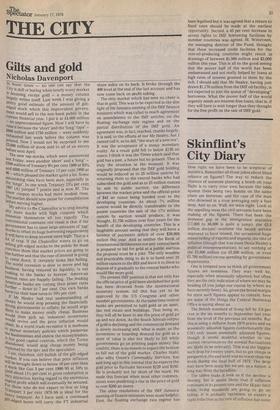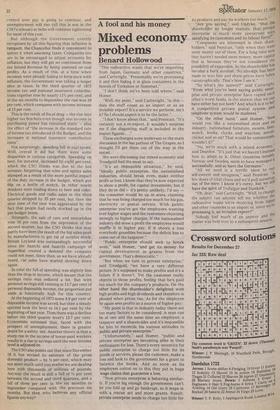Skinflint's City Diary
How right we have been to be sceptical of statistics. Remember all those jokes about blind reliance on figures? The way to reduce the chances of someone planting a bomb on your flight is to carry your own because the odds against there being two bombs on the same plane are immense; and the case of the man who drowned in a river averaging only a foot deep. And so on. Well, we were right. Look at the appalling mess the civil servants have been making of the figures. There has been the immense gap in the immigration statistics (17,000 to 86,000 is quite a jump), the £2.3 million doctors' overtime the health service appeared to have missed, the occasional huge misrecording of exports and imports, the rate of inflation (though that was more Denis Healey's political misrepresentation), to say nothing of the £5,800 million (or £5,500 million, or even £1,700 million) excess spending by government departments.
One is tempted now to think all government figures are nonsense. They may well be, especially when seasonally adjusted, but often they are the only indication of where we may be heading (if you judge our course by where we have recently been). So, given the broad margin for error such 'figures appear to contain, here are some of the things the Central Statistical Office is saying about us.
The British standard of living fell by 2.8 per cent in the six months to September last year from the level of the previous siX months. But this is using a deflator from 1970 prices and on seasonally adjusted figures (unfortunately the CSO only issues seasonally adjusted 'figures, though it seems doubtful whether in the current circumstances the normal fluctuations are likely to be relevant). This was the biggest such drop for twenty years, but to get things in perspective, the end level was no lower than the levels during the final half of 1973. The drop max' have been steep but we are, as a nation, a long way from the breadline.
The tables make it look as if the decline is slowing, but it seems likely that if inflation continues at its present rate and the £6 pay limit holds, living standards are going to go on falling. It is probably optimistic to expect a rapid reduction in the rate of inflation but some control over pay is going to continue, and unemployment will rise (all this is not in the CSO's release) so belts will continue tightening for most of this year.
But although the Government overtly recognises by all this figuring that inflation is rampant, the Chancellor finds it convenient to ignore it when assessing taxes. Companies too are to be encouraged to adjust accounts for inflation, but they will get no concession from the Inland Revenue by being assessed on real profits. As a result of this, at a time when incomes were already failing to keep pace with inflation, the Government was taking a larger slice in taxes. In the third quarter of 1975 income tax and national insurance contributions together rose by nearly 111/2 per cent, and in the six months to September the rise was 16 per cent, which compares with income increase of 12 per cent.
This is the result of fiscal drag — the rise into higher tax brackets even though real income in purchasing power has remained static — plus the effect of "the increase. in the standard rate of income tax introduced in the Budget, and the increases in national insurance contribution rates".
Not surprisingly, spending fell in real terms. Well, overall it did but there were some disparities in various categories. Spending on beer, for instance, increased by eight per cent, which the CSO thinks was due to the hot summer, forgetting that wine and spirits sales slumped as a result of the more painful impact of the duty increase in the budget, which put 64p on a bottle of scotch. In other words drinkers were trading down to beer and cider. Electrical goods and radio sales in the third quarter dropped by 25 per cent, but then the slow time of the year was aggravated by the fact that people had really stocked up in the pre-budget boom, Strangely, the sale of cars and motorbikes rose 10 per cent from the depression of the second quarter, but the CSO thinks this may partly have been the result of the big sales push by manufacturers to get rid of surplus stock. British Leyland was outstandingly successful since the Saatchi and Saatchi campaign of Superdeal created a demand the company could not meet. Since then, as we have already heard, car sales have started slowing down again.
In total the fall of spending was slightly less than the-drop in income, which meant that the savings ratio was reduced a bit. But with personal savings still running at 13:7 per cent'of personal disposable income, the proportion put aside is historically high for this country.
At the beginning of 1973 some 8.9 per cent of disposable income was saved, but then a steady uptrend took the level to 14.1 per cent by the beginning of last year. Then there was a decline before the third quarter level's 13./ per cent. Economists surmised that, faced with the prospect of unemployment, there is greater desire for a safety net. Another theory is that a sharp rise in the income of lower-paid workers results in a rise in savings until the new income level is adjusted to. . _ The CSO also points out that since December 19 it has revised its estimate of the gross domestic product — by 1/2 per cent, which may not seem much until you realise we are dealing here with thousands of millions of pounds. Anyway the result is still a fall of L/2 per cent between the second and third quarters, and a fall of three per cent in the six months to September compared with the previous six months. But then who believes any official figures anyway?



























 Previous page
Previous page